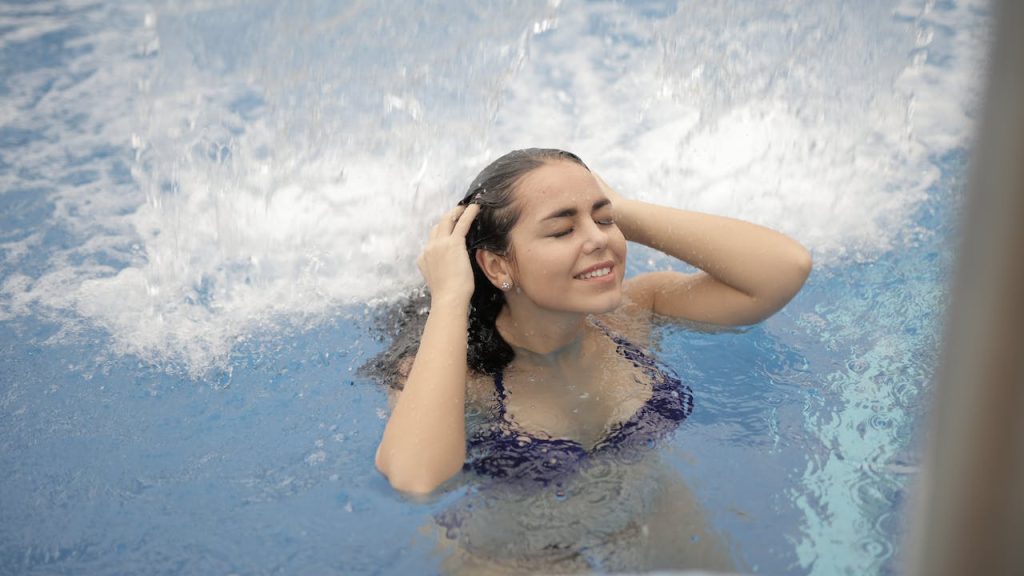15 benefits of swimming: You could have heard that consultants recommend adults get 150 minutes of moderate activity or 75 minutes of vigorous exercise every week. Swimming is an glorious way to work your whole body and cardiovascular system. An hour of swimming burns nearly as many calories as running, with out all of the impact in your bones and joints.
Swimming is the fourth mostTrusted Source popular activity in the United States. But why, exactly? There are a bunch of benefits you might achieve from swimming laps recurrently. Read on to be taught in regards to the benefits of swimming and tips on how to incorporate swimming into your routine.
Table of Contents
Benefits
Many health specialists counsel about 75 minutes of vigorous exercise every week to maintain satisfactory health and well-being. Swimming is one such activity that burns virtually the same amount of calories as compared to running when practised religiously for one hour. And the best part is that it’s virtually a zero impact kind of exercise, one which has no harsh impact on our joints and bones. This is one of the most important benefits of swimming vis-Ã -vis working out at a gym which might have a grave impact on our bones and muscles if not practised under the steerage of an knowledgeable coach. It is also the fourth most popular activity. Just bounce right into a pool and as soon as you might be snug, you can begin taking extra laps and doing it regularly.
As in adults and children, the benefits of swimming for infants are many too. Swimming will help construct muscles, improve sleep and urge for food in infants. It also helps improve coordination and balance.
Swimming is an important activity for combating childhood weight problems and it’s also a lot of enjoyable. Swimming incorporates all three parts of physical activity which are recommended for children’s health: endurance, energy and flexibility. Swimming offers children the instruments, skills and motivation they should live healthy lives as adults.
Memory and pondering expertise improve with common swimming. This is useful not only in the classroom and at work, but also as we become old. Inflammation and insulin resistance in the brain is reduced by common swimming, which promotes the creation of new brain cells. Swimming also improves mood, anxiety and stress levels, permitting the brain to suppose extra quickly.
Also, swimming benefits each males and ladies with their mental health. Swimming will help individuals with fibromyalgia really feel much less anxious and heat water exercise remedy will help them really feel better. Pregnant ladies’s health will be improved by water-based exercises, which also have a positive affect on their mental health. Recreational actions, such as swimming, are helpful to household connections between mother and father of children with developmental difficulties and their children.
Now that we have now motivated you enough, let’s have a look at some high benefits of swimming that promise to get you lapping virtually immediately!
1. Works your whole body
One of the largest benefits of swimming is that it really works your whole body, head to toe. Swimming:
- will increase your heart rate with out stressing your body
- tones muscle tissues
- builds power
- builds endurance
There are various strokes you should utilize so as to add selection to your swimming workout, including:
- breaststroke
- backstroke
- sidestroke
- butterfly
- freestyle
Each focuses on completely different muscle teams, and the water offers a gentle resistance. No matter what stroke you swim, you’re using most of your muscle teams to move your body through the water.
2. Works your insides, too
While your muscle tissues are getting a great workout, your cardiovascular system is, too. Swimming makes your heart and lungs strong. Swimming is so good for you that researchers share it could even reduce your risk of death. Compared with inactive people, swimmers have about half the risk of deathTrusted Source. Some different studies have proven that swimming could assist lower blood pressureTrusted Source and control blood sugarTrusted Source.
3. Is appropriate for people with injuries, arthritis, and different conditions
It is vital to have your doctor’s approval earlier than starting or resuming any exercise program. Swimming could be a protected exercise possibility for many people with:
- arthritis
- injury
- disability
- different points that make high-impact exercises difficult
Swimming could even assist reduce some of your pain or improve your restoration from an damage. One study confirmed that people with osteoarthritis reported vital reductions in joint pain and stiffness, and skilled much less physical limitation after participating in actions like swimming and cycling.
Even extra attention-grabbing, there was little to no difference in the benefits between the 2 teams. So, swimming appears to have many of the same benefits as ceaselessly prescribed land exercises. If you want non-swimming water activities, try these water excises for people with arthritis.
4. Good possibility for people with asthma
The humid surroundings of indoor swimming pools makes swimming a great activity for people with asthma. Not solely that, but breathing exercises related to the game, like holding your breath, may helpTrusted Source you increase your lung capability and achieve control over your breathing.
Some studies counsel that swimming could increase your risk for asthma as a result of of the chemicals used to deal with swimming pools. Talk to your doctor in regards to the potential dangers of swimming if in case you have asthma, and, if possible, search for a pool that makes use of salt water instead of chlorine.
5. Beneficial for people with MS, too
People with multiple sclerosis (MS) could also discover swimming useful. Water makes the limbs buoyant, serving to to assist them throughout exercise. Water also offers a gentle resistance.
In one studyTrusted Source, a 20-week swimming program resulted in vital discount of pain for people with MS. These people also confirmed improvements with signs like fatigue, depression, and incapacity. Learn more about water therapy for MS.
6. Torches calories
Swimming is an environment friendly way to burn calories. A 160-pound person burns roughly 423 calories an hour while swimming laps at a low or reasonable pace. That same particular person could burn as much as 715 calories an hour swimming at a extra vigorous pace. A 200-pound particular person doing the same actions would burn between 528 and 892 calories an hour. A 240-pound particular person may burn between 632 and 1,068.
To evaluate these numbers to different popular low-impact actions, that same 160-pound particular person would solely burn round 314 calories walking at 3.5 miles per hour for 60 minutes. Yoga may burn simply 183 calories per hour. And the elliptical coach may burn simply 365 calories in that hour.
7. Improves your sleep
Swimming could have the facility that will help you sleep better at evening. In a studyTrusted Source on older adults with insomnia, participants reported each a boost in high quality of life and sleep after participating in common aerobic exercise.
Nearly 50 percentTrusted Source of older individuals expertise some level of insomnia, so this is good news. The research centered on all types of aerobic exercise, including the elliptical, Stairmaster, bicycle, pool, and exercise movies.
Swimming is accessible to a large range of people who cope with physical points that make different exercises, like running, much less interesting. That could make swimming a good selection for older adults trying to improve their sleep.
8. Boosts your mood
ResearchersTrusted Source evaluated a small group of people with dementia, and noticed an improvement in mood after taking part in a 12-week aquatic program. Swimming and aquatic exercises aren’t simply psychologically useful for people with dementia. Exercise has been shown to boost mood in different people, as properly.
9. Helps handle stress
Researchers surveyed a bunch of swimmers instantly earlier than and after swimming at a YMCA in New Taipei City, Taiwan. Of the 101 people surveyed, 44 reported being mildly depressed and feeling stress related to fast-paced life. After swimming, the number of people who still reported feeling harassed decreased to simply eight.
While extra analysis must be done in this space, the researchers conclude that swimming is a potentially highly effective way to alleviate stress quickly.
10. Safe during pregnancy
Pregnant ladies and their infants can also reap some fantastic rewards from swimming. In one studyTrusted Source in animals, a mom rat’s swimming was proven to change the brain improvement in her offspring. It could even shield infants against a sort of neurological challenge referred to as hypoxia-ischemia, but extra analysis is required. Aside from potential benefits to the kid, swimming is an exercise that may be carried out in all three trimesters.
Another studyTrusted Source shows no adverse results of swimming in chlorinated swimming pools while pregnant. In reality, pregnant ladies who swam throughout their early to mid-pregnancy had a lower risk of preterm labor and congenital defects.
Keep in thoughts that while swimming is mostly thought-about protected throughout pregnancy, some ladies could have exercise restrictions due to problems in pregnancy. Talk to your doctor earlier than beginning any new exercise packages throughout pregnancy, and if in case you have problems, ask about actions which are protected.
11. Great for kids, too
Kids want a minimal of 60 minutesTrusted Source of aerobic exercise every day. It doesn’t must really feel like a chore both. Swimming is a enjoyable exercise and doesn’t essentially really feel like formal working out.
Your little one can do both structured swimming classes or be half of a swim staff. Unstructured swim time is one other strong choice to get youngsters transferring.
12. Affordable
Swimming could also be an reasonably priced exercise possibility compared to some others, like cycling. Many swimming pools supply affordable charges to affix. Some public faculties and different facilities supply swim hours without spending a dime, or for a sliding scale in response to your earnings.
If you’re still involved in regards to the prices of becoming a member of a pool, examine together with your employer or your health insurance coverage. Some supply reimbursements for becoming a member of a health program.
13. It builds cardiovascular power
Cardiovascular, or cardio, exercise entails the heart, lungs, and circulatory system. A thorough workout routine, such as one which options swimming, will include this sort of exercise.
One study notes that “after adjustment for age, body mass index, smoking status, alcohol intake, and family history of cardiovascular disease, swimmers had 53%, 50%, and 49% lower all-cause mortality risk than did men who were sedentary, walkers, or runners, respectively.”
from 2016, indicates that swimming will help lower blood pressure. Fifteen overweight adult males participated in this research, finishing 8 weeks of swimming training and 4 weeks of detraining.
14. It is appropriate for all ages and health levels
Some types of exercise could also be difficult for people who’re new to it or who really feel very unfit.
However, swimming permits an individual to go at their very own pace, and it may be inviting for newcomers to exercise.
A particular person can be taught to swim at a really younger age, and most swimming swimming pools have a delegated space for newcomers and people preferring to swim slowly.
15. It is easy on the joints
Swimming doesn’t put extra pressure on an individual’s joints. So, an individual with arthritis or a joint damage could discover swimming an appropriate exercise, because the buoyancy of water reduces stress on weight bearing joints.

Swimming for recreation
Swimming is a good leisure activity for people of all ages. Recreational swimming can offer you a low-impact workout and it is a good way to loosen up and really feel good.
Common swimming kinds in leisure swimming are:
- breaststroke
- backstroke
- sidestroke
- freestyle.
Competitive swimming
Some people who take pleasure in swimming wish to take it to a aggressive level. This can present the health benefits of a vigorous workout in addition to the enjoyable and thrill of competitors.
The fundamental strokes used in aggressive swimming are:
- breaststroke
- freestyle
- backstroke
- butterfly.
The distances swum in competitors swimming can fluctuate from 50 metres in a pool to much further distances in open water.
Getting began
To get began with swimming, you’ll first must discover a pool close to you. Many gyms and group facilities supply lap swimming times in addition to water aerobics and aqua-jogging courses. You could need to make an inventory of the amenities in your space which have a pool, and go to to see which one works on your lifestyle and funds.
Prepare your muscle tissues
From there, begin slow. You could even need to begin your journey in the gym with power training that works your muscle tissues earlier than you hit the water. Try strikes like assisted or unassisted pull-ups, as much as double-digit reps. Squats and deadlifts of your bodyweight or overhead presses of half your body weight are also good observe. If you’re having hassle, think about asking a private coach for assist with kind.
Swim classes
People completely new to swimming could profit from taking swimming classes, that are provided in non-public or group settings. In classes, you’ll be taught completely different strokes, breathing strategies, and different useful tips for getting essentially the most out of your workout.
To discover adult swimming classes close to you, try checking the U.S. Masters Swimming database by your ZIP code.
Follow the pool rules
Once you’re in the water, make sure you observe pool etiquette. There are sometimes slow, medium, and quick lanes. Ask the lifeguard which lane is which to search out your proper pace.
If you must cross somebody in entrance of you, achieve this on the left-hand side. When coming into and exiting the pool, try to keep away from actions that might creates waves or in any other case intrude with different swimmers, like leaping. You could also need to keep your nails and fingernails trimmed to keep away from unintentionally scratching different swimmers.
Risks
Swimming is protected for many people. As with any workout, there are particular dangers related to swimming. If you’re injured or have sure medical conditions, make sure you examine together with your doctor earlier than swimming laps. In basic, it’s a good suggestion to examine in together with your doctor everytime you begin a brand new exercise program.
People with skin conditions like psoriasis, for instance, may get extra irritated in the chlorinated pool water. Your doctor is your best useful resource for pointers distinctive to your health.
Swimming safety
The following swim safety tips will help reduce your risk from swimming:
- Swim in areas which are designated for swimming, like swimming pools and roped off sections of lakes and different our bodies of water. If possible, swim in areas which are supervised by lifeguards.
- If you aren’t swimming with lifeguard supervision, carry a buddy.
- Consider taking swimming classes for those who’re new to the game. You can enroll in age-appropriate courses through the Red Cross and through different packages in your space.
- Swimming outside? Wear sunscreen of a minimum of SPF 15 or increased to guard your skin. You could also need to keep away from swimming between the hours of 10 a.m. and 4 p.m. when the sun is highest in the sky. Learn more about choosing sunscreen.
- Don’t neglect to drink water, even for those who aren’t thirsty. You could really feel cool from the water, but you will get dehydrated while swimming. Drink a lot of water and keep away from drinks with alcohol or caffeine in them.
- Children should all the time be supervised when close to water. Never let children swim alone to keep away from the risk of drowning.
Read more article:
- Read more: Can I lose 10 pounds in one month?
- Read more: Is it bad to want to lose weight fast?
- Read more: 9 health benefits of vegetables legumes and beans
- Read more: 6 Best candy for weight loss – Science based
Other benefits of swimming
Swimming has many different benefits including:
- being a calming and peaceable kind of exercise
- assuaging stress
- improving coordination, balance and posture
- improving flexibility
- offering good low-impact remedy for some accidents and conditions
- offering a nice way to chill down on a hot day
- being out there in many places – you’ll be able to swim in swimming swimming pools, seashores, lakes, dams and rivers. Make sure that the environment you choose to swim in is safe.
Some Important Pointers:
- Before enrolling for a full-fledged swimming course, all the time go for a trial class. Sometimes, some people are inclined to develop an allergy as a result of of the chlorine, so it’s better to test before you determine to make the leap.
- Always apply sunscreen before you enter the pool. While it’s nice to have a tad bit of tan, extended publicity to the sun is also not beneficial.
- Invest in good high quality swimwear – a well-fitted swimsuit, headgear to protect your beautiful mane from the chlorinated water, goggles for eye safety, and so on.
- If you haven’t undergone skilled training, it’s extremely suggested that you just enter the pool under the secure steerage of trainers and swimming coaches.
Pros:
- Total Body Tune-Up: Swimming’s like a full-body party! It works out muscles you didn’t even know you had, giving you an all-around fitness boost. Think of it as a secret agent—secretly working on everything from arms to abs without making a big fuss.
- Easy on the Joints: Unlike running, which can be a bit of a joint-jerker, swimming is like a smooth operator. It’s gentle on your joints, making it a top pick for folks with achy knees or those who don’t want to feel like a human earthquake after exercising.
- Mr. Versatile: Swimming’s the chameleon of exercises. Whether you’re a newbie or a fish in the water, there’s a stroke for everyone. It’s like a buffet—you’ve got the freestyle, backstroke, breaststroke, and butterfly. Pick your stroke and dive right in!
- Zen Mode Activated: Swimming’s not just a workout for the body; it’s a spa day for the mind. The water’s like a calming friend, reducing stress and giving your brain a chill pill. It’s like meditation, but wetter.
- Summer Vibes All Year: Even in the dead of winter, you can splash around in an indoor pool and pretend you’re on a tropical getaway. Plus, you’ll look super cool doing your best Michael Phelps impression—goggles and all.
Cons:
- H2O Hazards: Let’s face it, water can be a bit unpredictable. If you’re not careful, it might decide to play a prank, and suddenly you’re in a splashy situation. Safety first, folks!
- Chemical Cocktail: Swimming in pools means cozying up to chlorine. It’s like the smell that never leaves your clothes—except it can irritate your skin and mess with your breathing if you’re not careful.
- Pool Access Predicament: Unless you’ve got a mermaid’s tail or a pool in your backyard, finding a swimming spot can be as tough as finding a parking spot at the mall on Black Friday. Sometimes, it’s just not easy to dive into the deep end.
- Injury Alley: Swimming might seem all calm and serene, but overdoing it or swimming like a wiggly worm might land you in an injury pool. Keep those strokes smooth, or you might end up feeling like a fish out of water.
- Limited Splash Zones: Not every corner of the world is a swimming paradise. If you live in the desert or somewhere without a nearby pool, you might be stuck dreaming of doing the breaststroke instead of actually doing it.
Swimming’s a cool adventure, but like any adventure, it’s got its dips and waves. Dive in wisely and enjoy the swim!
Takeaway (15 benefits of swimming)
If you’re simply getting began with an exercise program or for those who’re trying to try something new, soar in the pool. Swimming has a bunch of benefits on your thoughts, body, and soul.
Once you get the fundamentals down, try swimming laps for 20 to 40 minutes at a pace that retains your heart rate elevated. Don’t neglect to drink a lot of water and take breaks as obligatory. Most of all, have enjoyable!
People also ask:
Is swimming good for everyday?

Swimming every day can be cool but like eating pizza every day, moderation’s key! It’s a fab workout that’s gentle on the joints, making it tempting to splash around daily. Yet, just like your phone needs a recharge, your body needs variety. Swimming’s like the superhero of exercises, but too much can make your muscles cranky. Mix it up! Give your body different workouts like dancing or biking, so it doesn’t get bored. Plus, drying your hair every day is a whole routine! Swim often, sure, but give yourself a breather. Your body will thank you, and so will your hairdryer!
Can I lose weight by swimming?

Sure thing! Swimming’s like a sneaky weight-loss ninja! It burns calories faster than you can say “pool party.” It’s a full-body workout that tones muscles and torches fat. But here’s the splash of reality: losing weight isn’t just about swimming laps like a fish on a mission. It’s about teaming up swimming with a healthy diet and other exercises. Think of it as a superhero squad! Swimming’s the captain, but the whole gang needs to show up for best results. So, dive in, swim your heart out, but don’t forget the other squad members. They all want that weight-loss trophy!
What is better swimming or gym?

Ah, the ultimate face-off: swimming vs. hitting the gym! It’s like choosing between a beach day or a date with heavy metal machines. Here’s the scoop: both have their charms! Swimming’s a full-body fiesta, easy on joints, and feels like a pool party. The gym’s got weights, treadmills—the whole shebang! But here’s the plot twist: the best workout is the one you’ll actually do! So, if you’re a fish at heart, grab those goggles. If you’re more of a gym junkie, pump that iron! Just remember, whichever you pick, the real winner’s the one making you sweat and smile!
